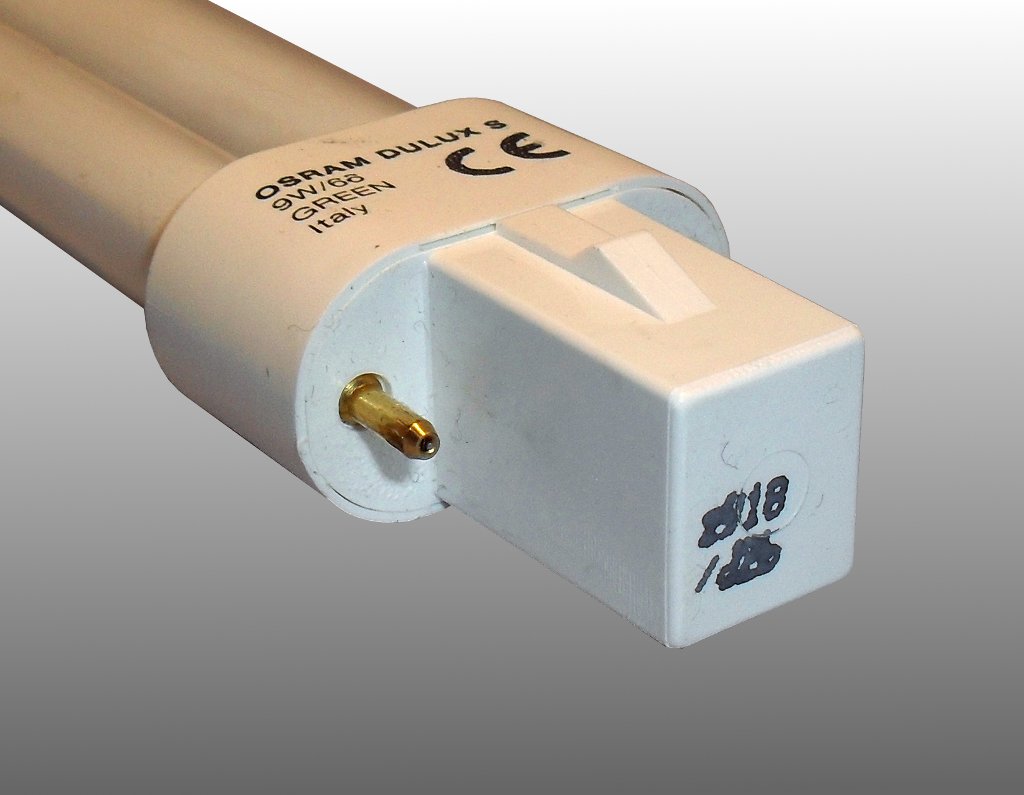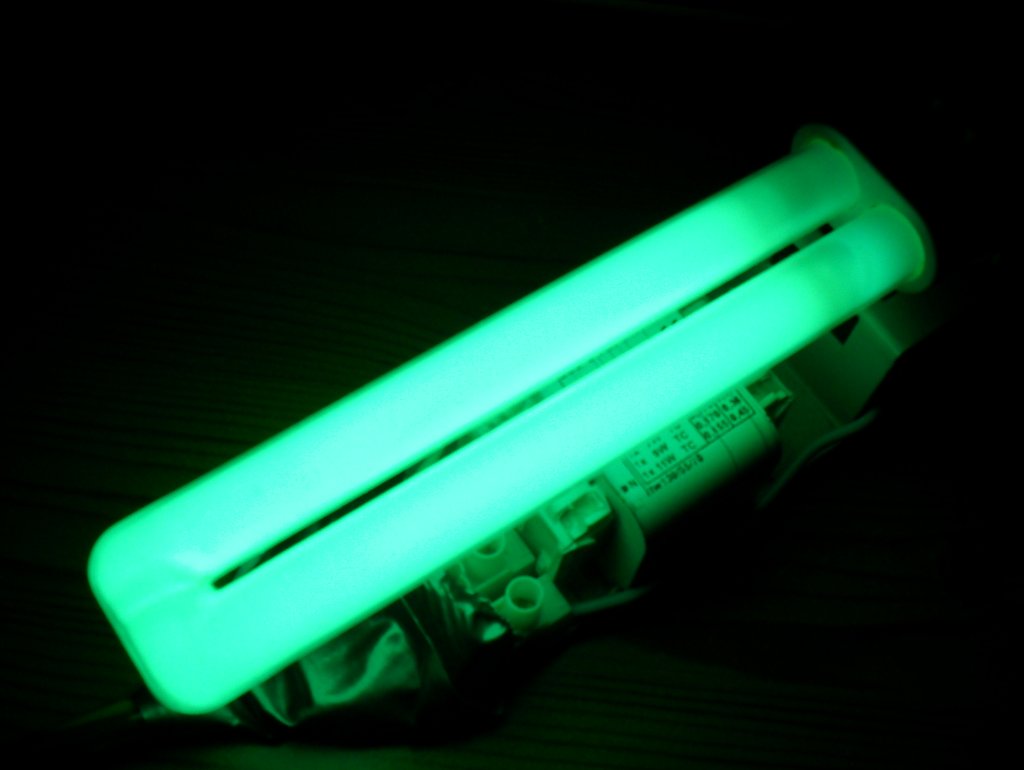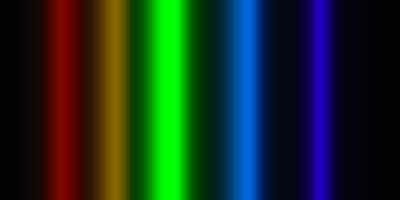
| Manufacturer: | Osram |
| Model: | Dulux S G23 9W/66 Green |
| Application: | Architectural or effect lighting |
| Wattage: | 9W |
| Width (max): | 32mm |
| Length: | 165mm |
| Tube Length: | 240mm |
| Bulb/Tube material: | Glass, colour 66 phosphor on inner surface |
| Colour Temperature: | Green |
| Peak output wavelength: | Not Known |
| Total light output: | 800Lm (Manufacturer's claim - 88.9Lm/W) |
| Rated lifetime: | Unknown Hours |
| Cap: | G23 |
| Operating voltage: | 60V AC Only |
| Operating current: | 170mA |
| Warmup/restrike time: | 1 minute/none |
| Cost (original): | Unknown |
| Value (now): | Compatible lamps available from BLT Direct for £7.14 (August 2010). Product now obsolete. |
| Place of manufacture: | Italy |
| Date of manufacture: | Unknown |
| Lamp Status: | Working, new in packaging. |
| Related Pages: | Osram Dulux S 9W Red Osram Dulux S 9W Blue |
Compact fluorescent lamps in
non-standard colours are not quite as unusual as they used to be,
starting to obtain a bit of a foothold for either decorative lighting,
or for use at occasions such as children's parties. They
generally however are adaptations of existing designs of integral
compact fluorescent lamps - aimed squarely at the domestic
market.
There are however an increasing number of manufacturers starting to
supply compact fluorescent lamps in colours which were previously
considered "non standard" - but generally have been available in linear
fluorescent form from specialist suppliers for a while. These
range from coated lamps required for vivid colours, and uncoated lamps
with non-white phosphors for more pastel shades.
Osram have launched coloured versions of their Dulux S lamps which are
intended for new installations, making use of a separate, permanently
fixed ballast assembly. The G23 lamp cap contains a conventional
glow-bottle starter and RFI suppression capacitor within the square
portion between the pins. This is a sensible feature, as when
fluorescent lamps fail, if they are not spotted quickly the starters
tend to fail with the contacts welded shut, and the lamp effectively
left in "pre-heat" mode permanently - and really, you should be
replacing the starter when you replace the tube anyway. This
arrangement ensures that with each new lamp a new starter is installed.
The presence of this starter and capacitor of course means that this
particular lamp is only suitable for use on conventional magnetic
ballasts. A four pin version which lacks the starter and
capacitor, hence is suitable for use on electronic ballasts does exist
however, which is otherwise identical.
As usual for Osram, the overall manufacturing quality is very good, and the lamp performs well. While the blue lamp produces a fairly saturated, both this and the red versions produce quite a pale coloured light - the so called red one, anyone on the street would describe as pink!
This green lamp produces a very unusual, and really quite hard to describe (and photograph!) coloured light. Not only is it a very unusual "whitish" green colour, but it is also very, very bright. While it may only be a 9W lamp, it's throwing out 800 lumens - and thanks to the non linear way that the human eye perceives different wavelengths, this *appears* brighter than it actually is anyway.
While their unusual colours mean that these lamps are maybe not ideal as a first choice for general lighting, as an accent for a room they really can work very well. My old room used to have either the blue or red version secluded behind the amplifier (which you can see on my desk in the image below) providing a gentle colour wash over the entire wall behind it (unfortunately the addition of the VCR and turntable to this stack means there's no space for it these days). The effect was really quite striking, and I don't doubt that if these lamps were used for example in a hotel conference room or corridor, to simply provide a splash of colour rather than as the main lighting source, the effect would work just as well.
I would be curious to know if a yellow version of this lamp (or any other colour for that matter) exist or have ever existed to compliment the three colours I have here. The main reason for this is that while red, green and blue lamps using a phosphor for the colouration are not unusual, I have only seen one clear lamp similar to this which I would have described as yellow, rather than very warm white.

Osram Dulux S G23 9W/66 Green Compact Fluorescent Lamp - General overview of lamp

Osram Dulux S G23 9W/66 Green Compact Fluorescent Lamp - Detail of lamp cap

Osram Dulux S G23 9W/66 Green Compact Fluorescent Lamp - Detail of lamp cap (closer view)

Osram Dulux S G23 9W/66 Green Compact Fluorescent Lamp illuminating my workstation from a distance of approximately two metres

Osram Dulux S G23 9W/66 Green Compact Fluorescent Lamp - Overview of lamp shown while lit

Osram Dulux S G23 9W/66 Green Compact Fluorescent Lamp - Overview of lamp packaging

Osram Dulux S G23 9W/66 Green Compact Fluorescent Lamp - Lamp shown held in hand for scale

Osram Dulux S G23 9W/66 Green Compact Fluorescent Lamp - Lamp output spectra

Osram Dulux S G23 9W/66
Green Compact Fluorescent Lamp - Detail of text printed on lamp base

This lamp added to the Virtual Display Shelf on the 2nd September 2010 at 21:16.
References: Lamp packaging, lamp markings and manufacturers datasheets.
Acknowledgements: Many thanks to the reader of this website who donated this lamp (and many others) for display!
This page was last updated on 15th June 2023: Changes to page format to improve readability on mobile devices and some background page code changes to improve search engine behaviour.